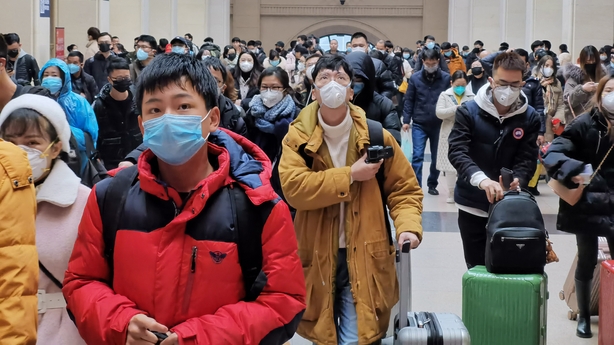Potential damage to business from China's fast-spreading coronavirus knocked more than 2% off European stocks today.
This comes after China, the world's second biggest economy, ramped up travel bans and extended the Lunar New Year holidays.
More than 97% of stocks in the STOXX 600 were trading in the red with many toppling from record highs, wiping out around €180 billion of market capitalisation from the European share index.
The biggest jolt was felt by luxury, airlines and hotel issues, which see big demand from Chinese consumers.
Europe's major luxury players have lost more than $50 billion in market value since the outbreak last week.
Meanwhile, safe-haven investment options such as gold and government bonds rose as the death toll from the outbreak in China increased to 81 and the number of cases of infection jumped by about 30% in a day.

A small number of cases linked to people who travelled from the outbreak's epicentre have been confirmed in more than 10 countries, including Thailand, France, Japan and the US, but no deaths have been reported elsewhere.
Led by a steep sell-off in luxury retailers, France's CAC was down 2.5% in trade. LVMH, Christian Dior, Hermes and Gucci owner Kering, which are heavily reliant on Chinese demand, fell more than 3%.
Other companies in the luxury space such as Burberry, Moncler, Swiss watchmakers Swatch and Richemont declined between 2.7% and 4.6% while airport retailer Dufry was set for its steepest one-day drop in more than a year.
The Frankfurt DAX had dropped 2.5% this evening, while London's FTSE index closed down 1.8% and the Dublin market ended the day 1.74% lower.
While most regional markets in Asia were closed today for the Lunar New Year break, Tokyo was open and fell 2%.
Bangkok plunged nearly 3% on worries about the Thai travel sector, while Mumbai, Wellington, Manila and Jakarta also suffered losses.
Comparing the new coronavirus with the SARS outbreak in 2002-03, Bernstein analysts highlighted that Chinese nationals accounted for just 2% of the global luxury goods market in 2003 versus a whopping 35% in 2019.
The Euro Stoxx 50 volatility index, European investors' 'fear gauge', has jumped to its highest level since December 3.
With rising travel curbs, flight operators Air France, Lufthansa and British Airways-owner IAG as well as Ryanair, cruise line operator Carnival, hotel group Accor and IHG took a hit, pushing Europe's travel & leisure index to a near seven-weeklow.
The basic resources index eyed its worst day in nearly six months hit by growth fears in China, the world's top metals consumer.

